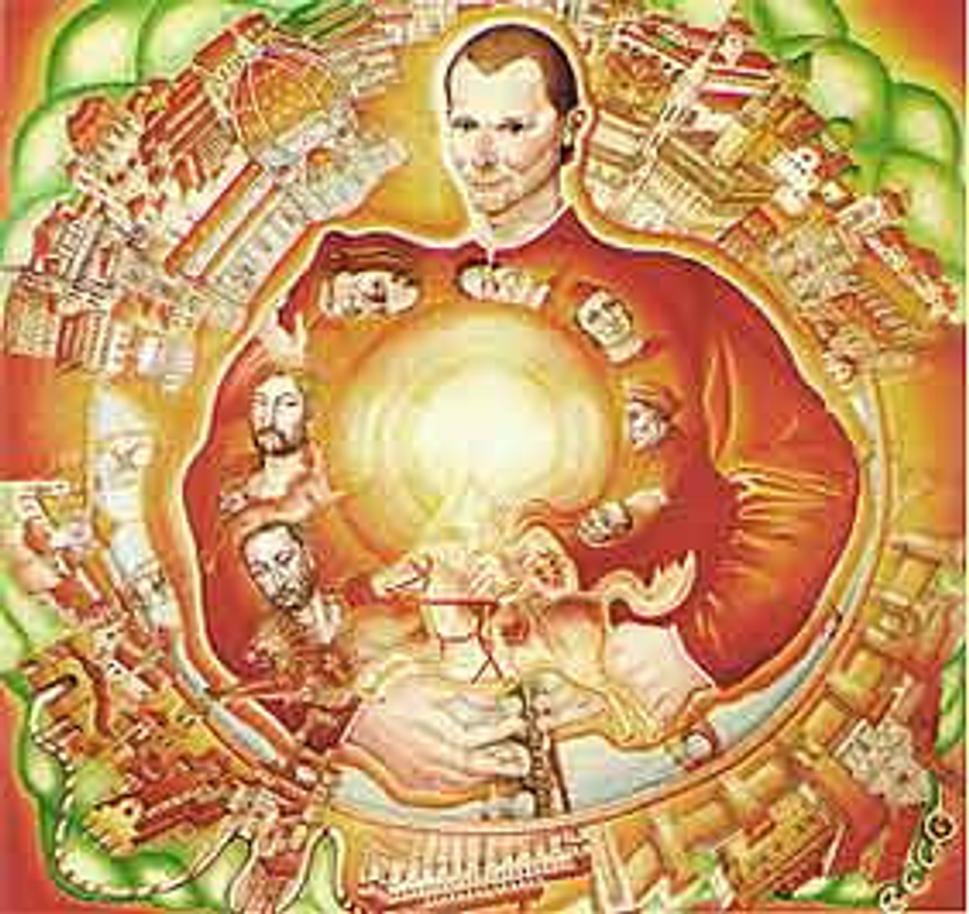
In this respect, the choice of its author was neither accidental nor meretricious as Quentin Skinner, holder of the 2006 Balzan Prize for “Political Thought; History and Theory“ , is not only an expert in the wider field of the history of the political thought, but he is also responsible for an earlier version, Machiavelli, published in the Past Masters in 1981. The author, whose lifelong focus is clearly, mirrored in his other logically and conceptually connected studies, to the one to be discussed - Machiavelli: A Very Short Introduction. Quentin Skinner is a Regius Professor of Modern History at the University of Cambridge, one of the most eminent and influential scholars of political thought who in the late 1960s and early 1970s elaborated a theoretical and philosophical point of view centred on the nature of political discourse understood as a series of linguistic acts, and on the historian’s task of interpreting texts in context. Consequently, the strong argument is to be expected: The core consists of considering Machiavelli as the exponent of a neo-classical form of humanist thought and his most original aspects of his political vision best understood as a series of polemical – sometimes even sarcastical – reactions against humanist assumptions he inherited and continued to endorse. Having this argument on mind, the analysis and critical reviewing is eventually in place to be launched mainly when learning that “One can have nothing but praise for the clarity and intelligence of the work.” THE LOGIC and STRUCTUREEven though, the strong argument already introduced above, tells us much, deductively, what the book is dealing with, it is to be specified further.The author is fascinated by Machiavelli´s reputation, which aims to examine while developing his argument actively using, excellent primary sources and those are Machiavelli´s own works – The Prince, The Discourses, The History of Florence.He not only actively uses those sources in relation to his argument and whole aim of the book – providing a clear insight into Machiavellian thoughts, but also those sources are logically structured within the book, in chronological order as Machiavelli himself was “shaped as a personality and though, his thoughts”. The author meaningfully incorporates the wide historical context of social, political, aspects and events taking place not only in his hometown – Florence, but also in Rome and Western Europe and not only in short period, but also within context of humanism and classical heritage influence, using other works of authors like Livy, Cicero, Sallust, Seneca, Boethius. In addition, the author’s aim is to provide essential evidences working with “contemporary” sources.The essence of the core Machiavellian thoughts are therefore evolving thorough whole book, through the three works chosen, however, in different compositions, context that either Machiavelli chose himself or he was charged, like it was The History of Florence, in fact, being shaped and influenced by objective social facts and phenomena of his period, which Skinner approaches in order to provide better understanding. In addition, the book consists of four attractively sounding parts, each relating to anybody else, but Machivelli – The Diplomat, The Adviser to Princes, The Theorist of Liberty, and The Historian of Florence.IN MEDIAS RES The sophisticated name – The Diplomat – deals with important processes that have a global and complex impact on Machiavelli, which also, as the author demonstrates in the first part of the book, served as material being accumulated for Machiavelli’s future works Firstly, Skinner approaches his familial background, consequently explaining the concept of the studia humanitatis and its immense influence on the centres of intellectual life, the universities , he gets to whole concept of humanism, which has to be, since very beginning of the book, definitely taken into account.Secondly, he describes the political processes in his hometown and importantly, launched his diplomatic career, substantially contributed to gaining many pivotal experiences in relations to formulation of his ideas.Skinner also deals with the important personalities, their acting, namely - the French king – Louis XII, on whose court he learned that powerful French only valued those who are well-armed or willing to pay , Cesare Borgia and the pope Julius II, who both figure in the book. He highlights their connections with Machiavelli´ s very core of his later works. The author interprets them as major sources of his future concepts, essential particles of his jigsaw being formed. He implies his judgements made on their policies Machiavelli was able to observe, being already in that time rather materialistic, in favour of “the sense of purpose and the use of every means and action possible” .Besides the basic portrayed, he develops another line, one of contemporary historical events, worthy for every thoughtful approach.Here I meant mainly the unique position and overall situation of Italy, its political, social development, dynamic processes, as were certainly those Florence was being vexed by struggles for political power, changes of political establishments – tyranny versus republicanism. Finally he even examines external influences that interfered regularly, especially by material means. In The Adviser to Princes, Skinner puts forward his position of being rather analyst than player on the political scene. This role could have helped him to be more impersonal, objective, though, he adds that Machiavelli highlights one particular type of case, because its local and personal significance revealing the intention to focus his original readers attention on one particular time and place – Florence, where Medici comeback occurred. The collapse of republican regime was one of the milestones of his life, affecting his life from foundations, as Skinner portrays in his works later on. Nevertheless, Skinner argues that this does not mean irrelevance of Machiavelli’s arguments, but his position should be perceived as method of shared observation.Further on, he develops the thesis of often hidden influence of “The Classical Heritage”, connecting him with a fruitful era of mankind. Considering the diversity of readers, Skinner quotes from classical works to enliven and support his argument about Machiavelli’s influences. Developing the antique influences, Skinner gets to the pivotal term of Machiavelli’s works, providing a solid definition of the concept of virtú, through an antique ideal of Fortune that was mainly used for his own explanations, implied in his theories in order to provide explanations. This can explain large portion of individualism of his focus. The author characterizes the concept so deeply that one can sometimes have a feeling of reading a different book, though, this theory under a veil of personification or a bit of empathy, clearly explains Machiavelli’s strong materialism and perception of the virtú, firstly established in The Prince, however, in the overall context that was based on permanent power balancing and militarism among political units, as Skinner permanently demonstrates. Neither did he forget on intersecting of strong Christian philosophy of Machiavelli’s era, which morality that contributed to his evil reputation. Worth mentioning are author’s arguments that mainly consist of a Machiavellian idea consequently explained why did it came into existence implying facts he went through, observed like e.g. his opinion of uselessness of mercenaries, supported by Machiavelli’s observations, though universally employed in that time . Next, Skinner analyses concretely his advices to new princes, namely “good laws” with its importance primary subordinated to possession of own troops as Borgia had, whose daring strategy appears, according to Skinner, to have had a decisive impact on the formation of Machiavelli’s ideas , revealing their materialist bases, however, life sustaining in his era. What is also interesting is the paradox that Skinner constructs from Machiavelli’s deconstructed context, is his confrontation also with the classical concept of morality or rather his accustomed perception of behaving as virtuously as possible to his current reality so that it changed its till-then moral content. In contrast, Skinner here argues that his total rejection of fundamental humanist assumption of acquiring moral qualities, is in his case, based on agreeing with their targets, though reaching them in more functionalistic and according to his experiences, sure way, whereas the other ways had been permanently missing the target. “To hold a power” Skinner defines as the core target(to be achieved) of Machiavelli’s contemplations in The Prince and his future works as well, however in slightly changed version – according to his principle of adapting to the times.Basing his claims again on his observations, that the author re-constructs, Machiavelli concretely describes the personality of an ideal prince, less vulnerable, able to hold the power in turbulent times, using his accumulated knowledges inspired by men, again like Juluis II and Borgia, whose acts and contemporary circumstances, highlighting the term of the necessity, Skinner approaches.He shows how Machiavelli constructing concrete situations negated all Christian virtues by preferring rather so-called vices in order to secure smaller evil than those virtues can cause in future. All this being helpful in understanding Machiavelli’s controversial opinions is thus based on unique or differing understanding of virtues in tightly rooted moral-religious dogmas.Later on, in The Theorist of Liberty, as the times - Machiavelli’s own situation had changed; his opinions were being formed under new influence of humanist group, fond of republicanism, which he joined.As Skinner puts explicitly forward, in The Discourses, his key opinions had just transformed, focusing on target of “the greatness of city” because of its liberty. So, again, how to maintain it?!In this respect, author shows his attention shifted from the qualities of an individual to qualities of an aggregate, which give an impression of an attempt to be attiring for more people, be more acceptable, developing more attractive concept of the necessity.Thus the controversiality again re-emerges, when he calls for looking back to great Rome’s father – Romulus and his methods like being violent to restore , in order to secure the common good.The vicious circle appears as well when Skinner puts forward “Machiavelli’s dilemmas” of abilities of an individual that are surely not altruistic versus common good in order to enter another the discussion of preventing the corruption, belauding outstanding individuals, all solutions found in an example of Rome’s organization, pragmatic institutions, namely civic religion and its values as a tool, which recalls the core of realist theory.Worth mentioning is also his concept of balance of power within the city in order to sustain an equilibrium, filtered through the legal institutions.In addition, Skinner explains the horrified reactions of well-established and horrified promoters of Florentine republican thoughts.The final drop came in form of external affairs, expansionist policy, full of realism, material kinds and positive example of imperialistic Rome, whereas, the negative one of Florence.Finally, the core of his ideas is defined in the third work The History of Florence, containing an overall synthesis and kind of “application of his own political theory”.CONCLUSION To sum up, author’s approach to this controversial figure is completely relevant and his core argument is logically justified and developed enough, convincing, suitable, making whole topic fairly interesting like e.g. significant analogies between his theories and IR realist theories, which in some periods of 20.th century become the most respected and attractive.Moreover, reading the book was enjoyable, discovering Machiavellian theories in smart way encountering unknown facts throwing light on him in context, in process of intersecting influences contributing to overall understanding and de facto proving Machiavelli being shaped himself by his age and the history, playing an essential role in further political theorizing .In addition, the author has made the subject and a person of 16.th century an amazing centre of interest even today, tempting for further debates, appreciating the insight created thanks to the author’s brilliant approach.To conclude, I find the opinion of Sydney Anglo relevant as I agree this study is important and must now stand – through Professor Skinner’s remarkable powers of scholarly synthesis and conciseness – as a classical statement.






